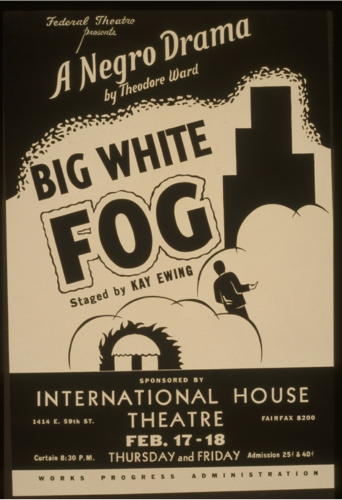Fading Into Obscurity: Theodore Ward’s Big White Fog

staged by Kay Ewing (Library of Congress).
When Big White Fog premiered in 1938, it was produced by the Negro Theatre Project, a division within the Federal Theatre Project. Although the play was among the more successful productions from the Federal Theatre Project, especially in Black drama, it has remained relatively obscure for several reasons. The script was not widely available to the public until 1974, when it was published in Black Theatre USA, and to this day, there have only been a few professional productions, including a 1995 staging at the Guthrie Theater and a 2007 production at the Almeida Theatre in London. Nonetheless, Big White Fog marked a crucial moment in the early history of African American theatre.
In an essay I wrote for the Cambridge Companion to African American Theatre (2nd Edition) titled “Staging Black Lives Matter,” I stated that a “survey of African American theatre history will illustrate how Black theatre artists have always used the stage as a space to confront social crises of the moment.” For Ward, the crisis was the loss of hope for Black Americans who, already facing racial discrimination, were on the brink of economic deprivation. Serving as a prelude to Black dramas that addressed the devastating impacts of anti-Blackness and capitalism, including Lorraine Hansberry’s A Raisin in the Sun and Amiri Baraka’s Dutchman, Ward pioneered a genre of plays that showcased the various ways African Americans responded to race and class oppression.
Big White Fog, however, is not about African Americans as victims. Instead, Ward has written a play where his characters, especially the Mason family, engage in meaningful discussions about the struggles and potential of their race. In doing so, Ward demonstrates how the “domestic setting,” according to theatre scholar Harry J. Elam, Jr., acts as “a microcosm of the social and cultural concerns impacting African American life. Within such Black family dramas, the personal lives of the family have been most evidently political.” A historical survey of the African American dramatic canon supports Elam’s point, with plays as early as Rachel (1916) by Angelina Weld Grimké to more contemporary works, including Purpose (2024) by Brandon Jacobs Jenkins, which won the 2025 Pulitzer Prize for Drama.
Besides focusing on the Black family, Ward’s Big White Fog also documents African American history. In other words, the play, like many Black dramas, offers a look into a specific period, giving today’s audiences a chance to understand historical moments as they are depicted on stage. In the case of Big White Fog, audiences see several key moments in American history overall, and African American history in particular. These moments include the Great Migration, when Blacks moved from the South to the North in search of a better life, the rise of Black Nationalism through Garveyism, and the economic struggles faced by African Americans during the Great Depression.
Court Theatre’s production of Big White Fog emphasizes the importance of African American dramas as classic theatre and honors Chicago’s own Theodore Ward. A play that still resonates today, this production introduces new audiences to a prominent playwright in American theatre history, helping to prevent him and his works from fading into obscurity.